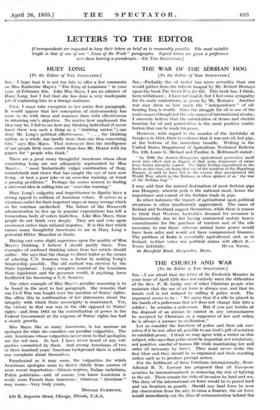LETTERS TO THE EDITOR [Correspondents are requested to keep their
letters as brief as is reasonably possible. The most suitable length is that of one of our " News of the Week " paragraphs. Signed letters are given a preference over those bearing a pseudonym.—Ed. THE SPECTATOR.] HUEY LONG [To the Editor of THE SPECTATOR.] hope that it is not too late to offer a few comments on Miss .Katherine Mayo's " The King of Louisiana " in your issue of February 8th. Like Miss Mayo, I am no admirer of Huey Long; but I feel that she has done a very inadequate job of explaining him to a foreign audience.
First, I Must take exception to her entire first paragraph. It would appear that her conception of statesmanship has more to dci with dress and manners than 'with 'effectiveness in obtaining one's objective. No matter how unpleasant the idea may be, I fail to see how any thinking individual (I never knew there '*-as such a thing as a " thinking nation ") can deny Mi. Long's political effectiveness. " . . . the thinking nation, as a whole, has hardly more thaii one idea concerning him," says Miss Mayo. That statement does the intelligence of our people little more credit than does Mr. Hearst with his papers for " people who think."
There are a great many thoughtful Americans whose ideas concerning Long are not adequately represented by Miss Mayo's : " most fantastically vulgar combination of thug, mountebank and clown that has caught the eye of men now living—at best a poor joke or an over-due warning, at worst a passing pestilence." Perhaps she comes nearest to finding a universal idea in calling him an " over-due warning."
Huey Long's vulgarity and impertinence to dignity have a strong appeal to millions of American voters. It serves as a vicarious outlet for their impotent anger at many wrongs which so far continue unchecked. The failure of the Roosevelt administration to live up to popular expectations has left a tremendous body of voters leaderless. Like Miss Mayo, these people do not think very deeply. They act and vote upon emotional rather than rational impulses. It is this fact which causes many thoughtful Americans to see in Huey Long a potential Hitler, Mussolini or Stalin.
Having cast some slight aspersions upon the quality of Miss Mayo's thinking, I believe I should justify them. Two examples of confused thinking taken from her article should suffice: She says that the change to direct ballot as the means of selecting U.S. Senators was a factor in making Long's Senatorship possible. The old method was election by the State legislature. Long's complete control of the Louisiana State legislature and the governor would, if anything, have facilitated his becoming a U.S. Senator.
The other example of Miss Mayo's peculiar reasoning is to be found in the next to last paragraph. She remarks that our Civil War was fought over the question of States' rights. She offers this in confirmation of her statements about the integrity with which State sovereignty is maintained. Yet, the victory in that war was to the side opposed to States' rights—and from 1865 on the centralization of power in the Federal Government at the expense of States' rights has had a steady growth.
Miss Mayo, like so many Americans, is too anxious an apologist for what she considers our peculiar vulgarities. The only Americans whose vulgarities never seem to find apologists are the- red men. In fact, I have never heard of any vul- garities committed by them. And 'among Americans of two Or 'three hundred years' American background there is seldom any complaint about themselves.
Paradoxical as it may seem, the vulgarities for which Amerieans apologize seem to derive Chiefly from sources of more recent importation—African negroes, Italian racketeers, Poli2sh ,politicians—and, of course, you know Louisiana is really more French than American : whatever " American " may mean.—Very truly yours,
DONALD CTJXXINGS.
150 -E. Superior Street, Chicago, Illinois, U.S.A.- -










































 Previous page
Previous page